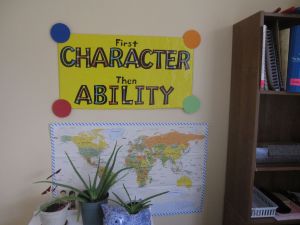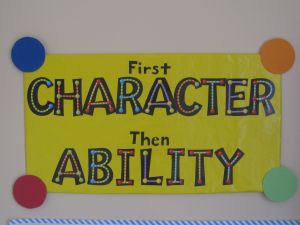A modern proverb that we hear frequently is “Don’t compare your kids to other kids.” It truly is an important piece of advice because every child is different, and each develops at a different pace. Homeschooling, however, makes following that advice extra difficult, I think. Since our kids aren’t in a school where all the kids of a particular age are being presented the same material at the same time, we homeschooling parents wonder at times, “Am I teaching what he should be learning right now?” “Do I have him on track with others his age?” We homeschooling parents aren’t trying to make a better than/less than judgement call, but just evaluating our own academic plan for our children, compared with what other children are learning.
Of course, in our current society, academics are ranked as Top Priority. It seems like kids now are learning material a year or two earlier than I did in school. Even at the kindergarten level, I remember all year learning about the Letter People – focusing on one letter each week. Mrs. Blakeman’s kindergarten class with the inflatable Letter People hanging from the ceiling is a cherished memory of mine! But now it seems as though children are expected to know all of the letters by the time they start kindergarten – kindergarten is now time to learn how to read. (Please correct me if I’m wrong on that.)
The funny thing about that to me is that children are pushed to higher levels of academics at earlier ages, and yet character development is barely in the picture. Personal responsibility, hard work, perseverance…those seem to have been thrown out the window. I’ve heard stories of parents contacting their child’s college professors because the work is too hard. A friend of mine who is a college professor was telling me recently that his students don’t know how to read for comprehension – they can only scan for specific information to answer a specific question.
Last summer as we were preparing for Drama Queen to begin piano lessons, her teacher gave me some assigned reading so I could learn about the Suzuki method. One quote (from Shinichi Suzuki’s book, Nutured By Love) stood out to me: “First character, then ability.” If I remember correctly, it was the motto of his childhood school, and it had a big impact on him. It really spoke to me as well – to the point that I made it our school motto.
We love academics around here, we really do. Drama Queen has made huge improvement in her reading skills over the past few weeks, which is very fun and exciting. Plus, she is practically giddy over learning any math I put in front of her. Mr. Bang, meanwhile, isn’t all that interested in his own work, but eats up anything I do with Drama Queen. When I give her math challenges just in normal day-to-day situations, he almost always spits out the (correct) answer before she even has a chance. In addition, my little first grade girly-girl has gotten herself interested in some of the major American wars, so at her request, we’re spending this semester focusing on one war a month: Revolutionary, Civil, WWI and WWII. Academics are fun; we love learning new things!
However, I regularly emphasize to my children that academics are not the number one priority. Your character is what really determines what your quality of life will be and what impact you will have on others. Because of this, I don’t want to leave character development to chance; I want it to be an integral part of the learning that happens in our home. Last spring at the Great Homeschool Convention (which is much better than its cheesy name implies), I went to a session with Sonya Shafer of Simply Charlotte Mason, focusing on character development. Her recommendation was to spend a few months really focusing on developing one character trait, which is the approach we are taking.
There are a few different things we do to help develop the trait we’re focusing on. For one thing, I bought Shafer’s book, Laying Down the Rails, which is a great parent resource to understand what are appropriate expectations within a particular character trait. I see that she also has one now for children that includes stories and activities and such to help motivate children to develop each character trait. I don’t have that one yet, but I am certainly intrigued. (If you have it, what do you think?)
I also bought a We Choose Virtues kit with fun posters to display as we focus on a particular trait. With each new one we focus on, I hang the larger poster in the upstairs hallway, between their bedrooms. We keep the smaller cards in the dining room and frequently use lunch time to review them.
I read lots of stories to them, stories which highlight that particular character trait. My favorite sources are the Bible and The Book of Virtues, but of course, there are many other good sources. Two others that we use frequently are My ABC Bible Verses and A Child’s Book of Character Building.
There was one other idea that I received back in February when I was visiting my former church in Virginia. This idea was sent home with all the parents as a way to continue what the kids were learning at church, and I loved it! Six months later, I have finally made my adapted version for my family.
We’re using these face flowers as a way to encourage us to watch for the current character trait in each other. Each morning, the flowers start out flat on the table. As one of us sees another family demonstrating the focus-area character trait, we get to put that person’s flower in the pot. During dinner, we are able to share how we saw family members demonstrating that trait. For instance, right now we’re focusing on one trait a week, reviewing the three we emphasized last year. This week our character trait is obedience. When Mr. Bang put his dishes away after breakfast without being reminded, he was showing obedience, so his flower went in the pot. When Drama Queen put her clean clothes in her dresser as soon as I told her to, Ethan saw that she was demonstrating obedience, so he put her flower in the pot. Now, obedience is a little different from honesty or self-control or others, because you have to be showing obedience to someone in authority over you. As Christians, The Brain and I believe that our obedience is to our Lord, so we had the kids brainstorm with us what it looks like when we are being obedient to God. They are able to watch for those things (disciplining in a calm manner instead of yelling, teaching them diligently, working hard to provide for the family, etc.) to be able to put our flowers in the pot.
The Brain and I took some time at the beginning of this school year to list our highest goals for our children. Academics, of course, were in the list, but at the very top was that they grow into adults of strong character. The thing about character development is that all children are constantly learning the level of character that is expected of them. We want to be intentional about our children’s character development so that positive character traits become just a natural part of who they are. Charlotte Mason made a great statement about that:
“Every day, every hour, the parents are either passively or actively forming those habits in their children upon which, more than upon anything else, future character and conduct depend.”
What do you do to develop strong character habits in your children? Are there any relevant children’s books that you recommend?







